University Essay: Prospects for Regional Security in Asia Pacific
VerifiedAdded on 2023/01/19
|8
|2090
|31
Essay
AI Summary
This essay examines the prospects for regional security in the Asia Pacific, focusing on the rising influence of China and its implications for the United States, Japan, and Australia. It analyzes the historical context of regional security, the impact of the Cold War, and the evolving power dynamics in the 21st century. The essay explores China's economic growth, its assertive foreign policy, and its challenges to the existing international order. It also considers the roles of Japan and Australia, including their relationships with the US and Indonesia. The analysis highlights the shift from a unipolar to a multipolar world order, the weakening of US strategic supremacy, and the potential for instability in the region due to Sino-US conflicts. The essay concludes by asserting the region's movement towards a post-US hegemonic order.
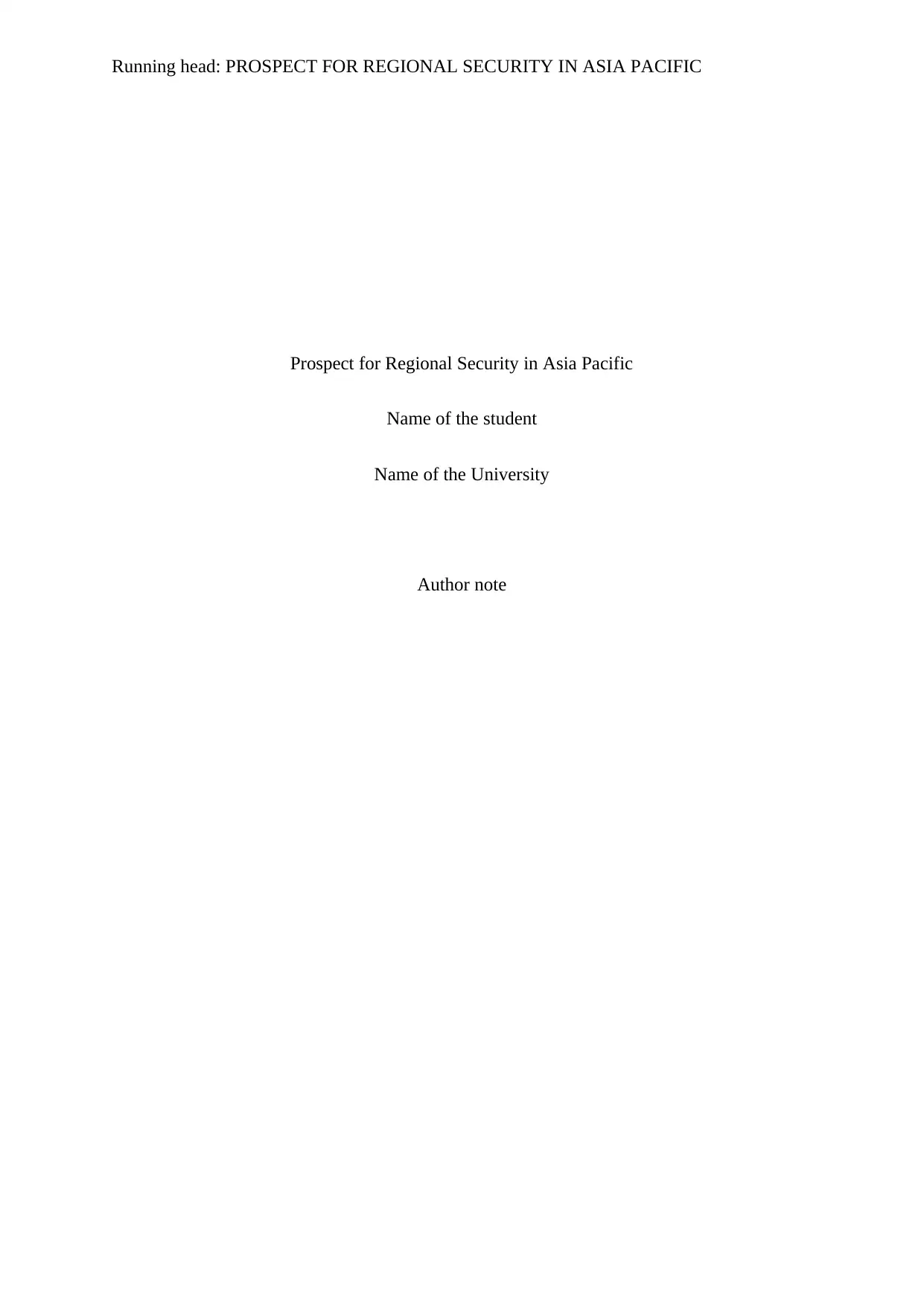
Running head: PROSPECT FOR REGIONAL SECURITY IN ASIA PACIFIC
Prospect for Regional Security in Asia Pacific
Name of the student
Name of the University
Author note
Prospect for Regional Security in Asia Pacific
Name of the student
Name of the University
Author note
Paraphrase This Document
Need a fresh take? Get an instant paraphrase of this document with our AI Paraphraser
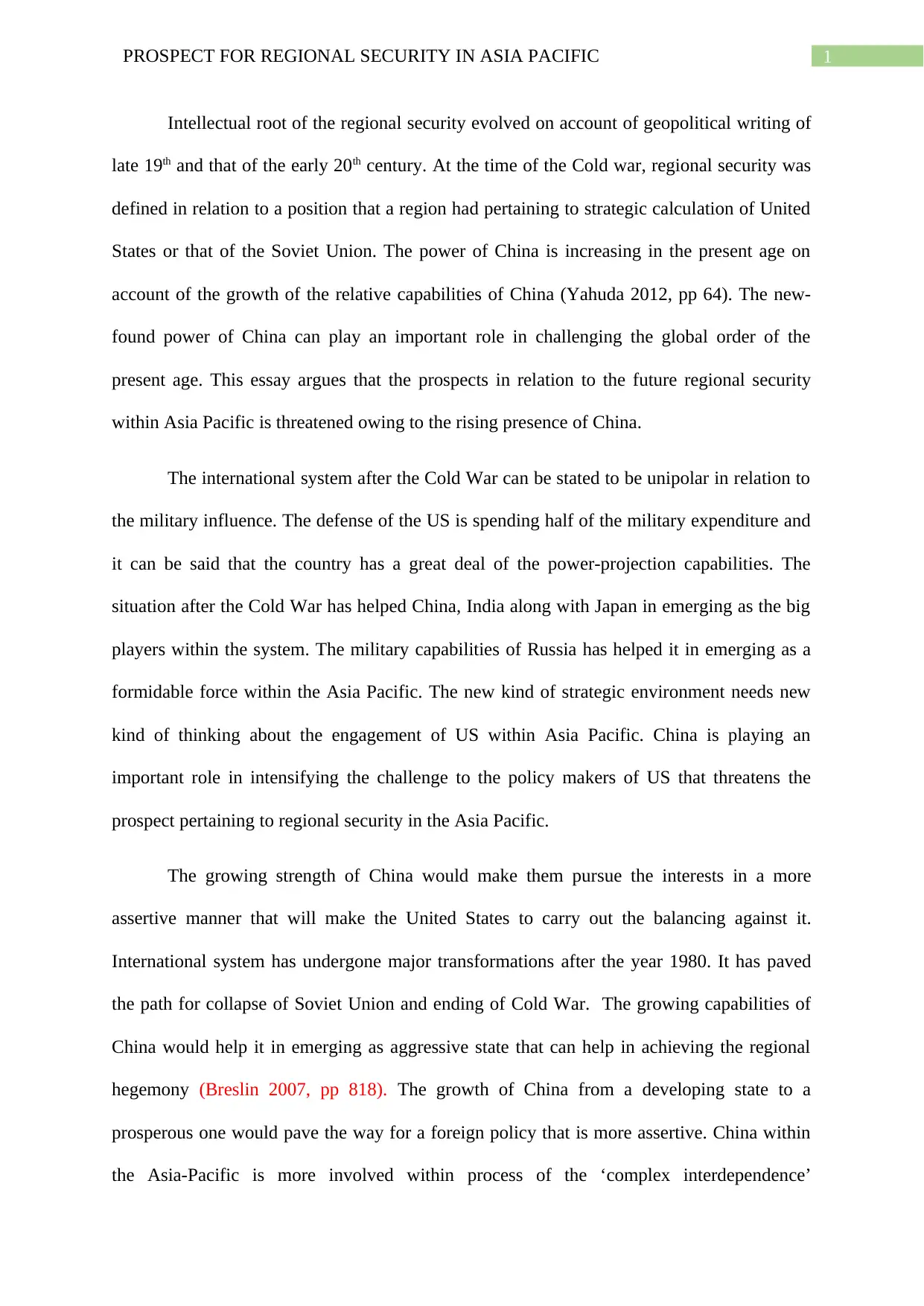
1PROSPECT FOR REGIONAL SECURITY IN ASIA PACIFIC
Intellectual root of the regional security evolved on account of geopolitical writing of
late 19th and that of the early 20th century. At the time of the Cold war, regional security was
defined in relation to a position that a region had pertaining to strategic calculation of United
States or that of the Soviet Union. The power of China is increasing in the present age on
account of the growth of the relative capabilities of China (Yahuda 2012, pp 64). The new-
found power of China can play an important role in challenging the global order of the
present age. This essay argues that the prospects in relation to the future regional security
within Asia Pacific is threatened owing to the rising presence of China.
The international system after the Cold War can be stated to be unipolar in relation to
the military influence. The defense of the US is spending half of the military expenditure and
it can be said that the country has a great deal of the power-projection capabilities. The
situation after the Cold War has helped China, India along with Japan in emerging as the big
players within the system. The military capabilities of Russia has helped it in emerging as a
formidable force within the Asia Pacific. The new kind of strategic environment needs new
kind of thinking about the engagement of US within Asia Pacific. China is playing an
important role in intensifying the challenge to the policy makers of US that threatens the
prospect pertaining to regional security in the Asia Pacific.
The growing strength of China would make them pursue the interests in a more
assertive manner that will make the United States to carry out the balancing against it.
International system has undergone major transformations after the year 1980. It has paved
the path for collapse of Soviet Union and ending of Cold War. The growing capabilities of
China would help it in emerging as aggressive state that can help in achieving the regional
hegemony (Breslin 2007, pp 818). The growth of China from a developing state to a
prosperous one would pave the way for a foreign policy that is more assertive. China within
the Asia-Pacific is more involved within process of the ‘complex interdependence’
Intellectual root of the regional security evolved on account of geopolitical writing of
late 19th and that of the early 20th century. At the time of the Cold war, regional security was
defined in relation to a position that a region had pertaining to strategic calculation of United
States or that of the Soviet Union. The power of China is increasing in the present age on
account of the growth of the relative capabilities of China (Yahuda 2012, pp 64). The new-
found power of China can play an important role in challenging the global order of the
present age. This essay argues that the prospects in relation to the future regional security
within Asia Pacific is threatened owing to the rising presence of China.
The international system after the Cold War can be stated to be unipolar in relation to
the military influence. The defense of the US is spending half of the military expenditure and
it can be said that the country has a great deal of the power-projection capabilities. The
situation after the Cold War has helped China, India along with Japan in emerging as the big
players within the system. The military capabilities of Russia has helped it in emerging as a
formidable force within the Asia Pacific. The new kind of strategic environment needs new
kind of thinking about the engagement of US within Asia Pacific. China is playing an
important role in intensifying the challenge to the policy makers of US that threatens the
prospect pertaining to regional security in the Asia Pacific.
The growing strength of China would make them pursue the interests in a more
assertive manner that will make the United States to carry out the balancing against it.
International system has undergone major transformations after the year 1980. It has paved
the path for collapse of Soviet Union and ending of Cold War. The growing capabilities of
China would help it in emerging as aggressive state that can help in achieving the regional
hegemony (Breslin 2007, pp 818). The growth of China from a developing state to a
prosperous one would pave the way for a foreign policy that is more assertive. China within
the Asia-Pacific is more involved within process of the ‘complex interdependence’
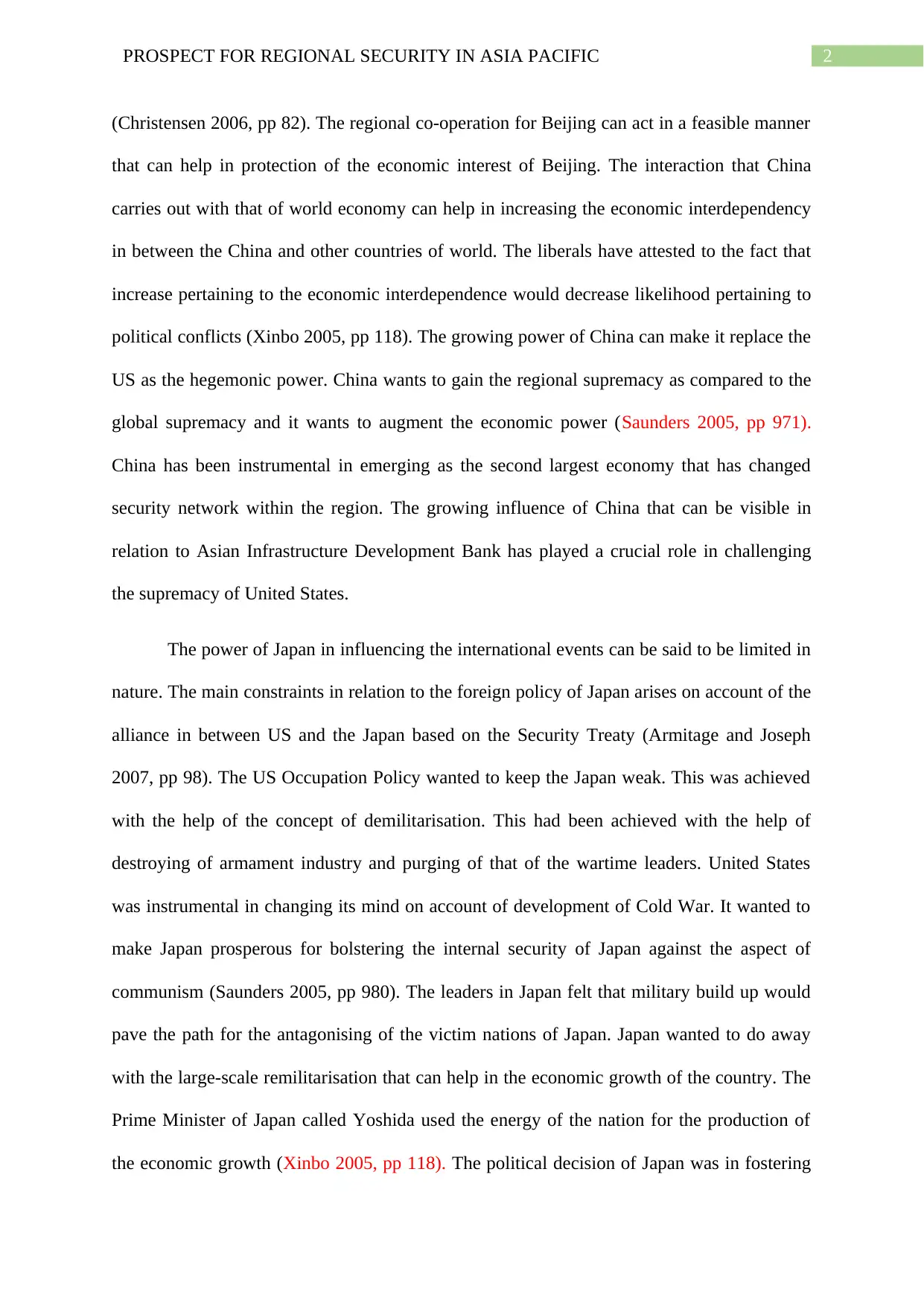
2PROSPECT FOR REGIONAL SECURITY IN ASIA PACIFIC
(Christensen 2006, pp 82). The regional co-operation for Beijing can act in a feasible manner
that can help in protection of the economic interest of Beijing. The interaction that China
carries out with that of world economy can help in increasing the economic interdependency
in between the China and other countries of world. The liberals have attested to the fact that
increase pertaining to the economic interdependence would decrease likelihood pertaining to
political conflicts (Xinbo 2005, pp 118). The growing power of China can make it replace the
US as the hegemonic power. China wants to gain the regional supremacy as compared to the
global supremacy and it wants to augment the economic power (Saunders 2005, pp 971).
China has been instrumental in emerging as the second largest economy that has changed
security network within the region. The growing influence of China that can be visible in
relation to Asian Infrastructure Development Bank has played a crucial role in challenging
the supremacy of United States.
The power of Japan in influencing the international events can be said to be limited in
nature. The main constraints in relation to the foreign policy of Japan arises on account of the
alliance in between US and the Japan based on the Security Treaty (Armitage and Joseph
2007, pp 98). The US Occupation Policy wanted to keep the Japan weak. This was achieved
with the help of the concept of demilitarisation. This had been achieved with the help of
destroying of armament industry and purging of that of the wartime leaders. United States
was instrumental in changing its mind on account of development of Cold War. It wanted to
make Japan prosperous for bolstering the internal security of Japan against the aspect of
communism (Saunders 2005, pp 980). The leaders in Japan felt that military build up would
pave the path for the antagonising of the victim nations of Japan. Japan wanted to do away
with the large-scale remilitarisation that can help in the economic growth of the country. The
Prime Minister of Japan called Yoshida used the energy of the nation for the production of
the economic growth (Xinbo 2005, pp 118). The political decision of Japan was in fostering
(Christensen 2006, pp 82). The regional co-operation for Beijing can act in a feasible manner
that can help in protection of the economic interest of Beijing. The interaction that China
carries out with that of world economy can help in increasing the economic interdependency
in between the China and other countries of world. The liberals have attested to the fact that
increase pertaining to the economic interdependence would decrease likelihood pertaining to
political conflicts (Xinbo 2005, pp 118). The growing power of China can make it replace the
US as the hegemonic power. China wants to gain the regional supremacy as compared to the
global supremacy and it wants to augment the economic power (Saunders 2005, pp 971).
China has been instrumental in emerging as the second largest economy that has changed
security network within the region. The growing influence of China that can be visible in
relation to Asian Infrastructure Development Bank has played a crucial role in challenging
the supremacy of United States.
The power of Japan in influencing the international events can be said to be limited in
nature. The main constraints in relation to the foreign policy of Japan arises on account of the
alliance in between US and the Japan based on the Security Treaty (Armitage and Joseph
2007, pp 98). The US Occupation Policy wanted to keep the Japan weak. This was achieved
with the help of the concept of demilitarisation. This had been achieved with the help of
destroying of armament industry and purging of that of the wartime leaders. United States
was instrumental in changing its mind on account of development of Cold War. It wanted to
make Japan prosperous for bolstering the internal security of Japan against the aspect of
communism (Saunders 2005, pp 980). The leaders in Japan felt that military build up would
pave the path for the antagonising of the victim nations of Japan. Japan wanted to do away
with the large-scale remilitarisation that can help in the economic growth of the country. The
Prime Minister of Japan called Yoshida used the energy of the nation for the production of
the economic growth (Xinbo 2005, pp 118). The political decision of Japan was in fostering
⊘ This is a preview!⊘
Do you want full access?
Subscribe today to unlock all pages.

Trusted by 1+ million students worldwide
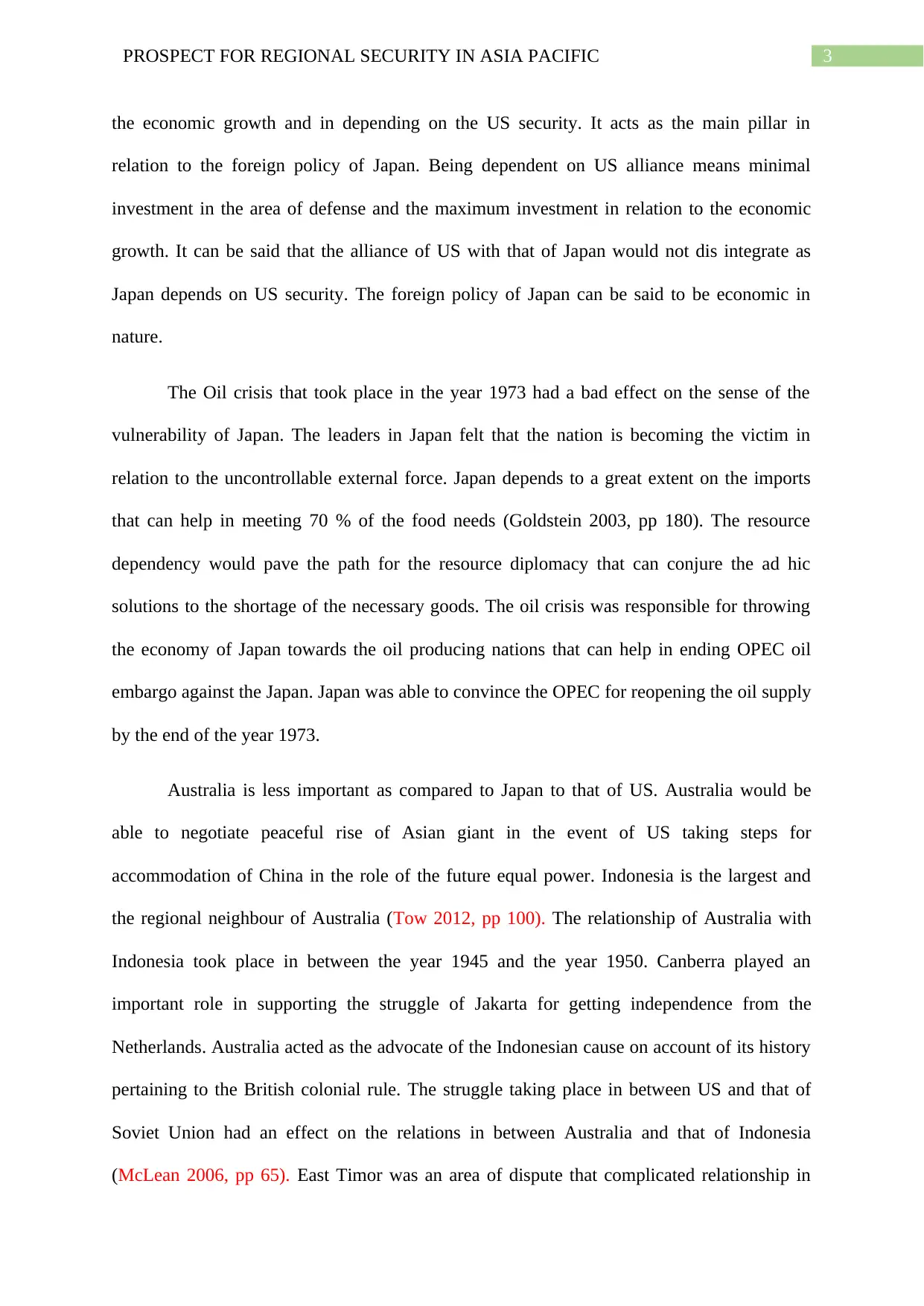
3PROSPECT FOR REGIONAL SECURITY IN ASIA PACIFIC
the economic growth and in depending on the US security. It acts as the main pillar in
relation to the foreign policy of Japan. Being dependent on US alliance means minimal
investment in the area of defense and the maximum investment in relation to the economic
growth. It can be said that the alliance of US with that of Japan would not dis integrate as
Japan depends on US security. The foreign policy of Japan can be said to be economic in
nature.
The Oil crisis that took place in the year 1973 had a bad effect on the sense of the
vulnerability of Japan. The leaders in Japan felt that the nation is becoming the victim in
relation to the uncontrollable external force. Japan depends to a great extent on the imports
that can help in meeting 70 % of the food needs (Goldstein 2003, pp 180). The resource
dependency would pave the path for the resource diplomacy that can conjure the ad hic
solutions to the shortage of the necessary goods. The oil crisis was responsible for throwing
the economy of Japan towards the oil producing nations that can help in ending OPEC oil
embargo against the Japan. Japan was able to convince the OPEC for reopening the oil supply
by the end of the year 1973.
Australia is less important as compared to Japan to that of US. Australia would be
able to negotiate peaceful rise of Asian giant in the event of US taking steps for
accommodation of China in the role of the future equal power. Indonesia is the largest and
the regional neighbour of Australia (Tow 2012, pp 100). The relationship of Australia with
Indonesia took place in between the year 1945 and the year 1950. Canberra played an
important role in supporting the struggle of Jakarta for getting independence from the
Netherlands. Australia acted as the advocate of the Indonesian cause on account of its history
pertaining to the British colonial rule. The struggle taking place in between US and that of
Soviet Union had an effect on the relations in between Australia and that of Indonesia
(McLean 2006, pp 65). East Timor was an area of dispute that complicated relationship in
the economic growth and in depending on the US security. It acts as the main pillar in
relation to the foreign policy of Japan. Being dependent on US alliance means minimal
investment in the area of defense and the maximum investment in relation to the economic
growth. It can be said that the alliance of US with that of Japan would not dis integrate as
Japan depends on US security. The foreign policy of Japan can be said to be economic in
nature.
The Oil crisis that took place in the year 1973 had a bad effect on the sense of the
vulnerability of Japan. The leaders in Japan felt that the nation is becoming the victim in
relation to the uncontrollable external force. Japan depends to a great extent on the imports
that can help in meeting 70 % of the food needs (Goldstein 2003, pp 180). The resource
dependency would pave the path for the resource diplomacy that can conjure the ad hic
solutions to the shortage of the necessary goods. The oil crisis was responsible for throwing
the economy of Japan towards the oil producing nations that can help in ending OPEC oil
embargo against the Japan. Japan was able to convince the OPEC for reopening the oil supply
by the end of the year 1973.
Australia is less important as compared to Japan to that of US. Australia would be
able to negotiate peaceful rise of Asian giant in the event of US taking steps for
accommodation of China in the role of the future equal power. Indonesia is the largest and
the regional neighbour of Australia (Tow 2012, pp 100). The relationship of Australia with
Indonesia took place in between the year 1945 and the year 1950. Canberra played an
important role in supporting the struggle of Jakarta for getting independence from the
Netherlands. Australia acted as the advocate of the Indonesian cause on account of its history
pertaining to the British colonial rule. The struggle taking place in between US and that of
Soviet Union had an effect on the relations in between Australia and that of Indonesia
(McLean 2006, pp 65). East Timor was an area of dispute that complicated relationship in
Paraphrase This Document
Need a fresh take? Get an instant paraphrase of this document with our AI Paraphraser
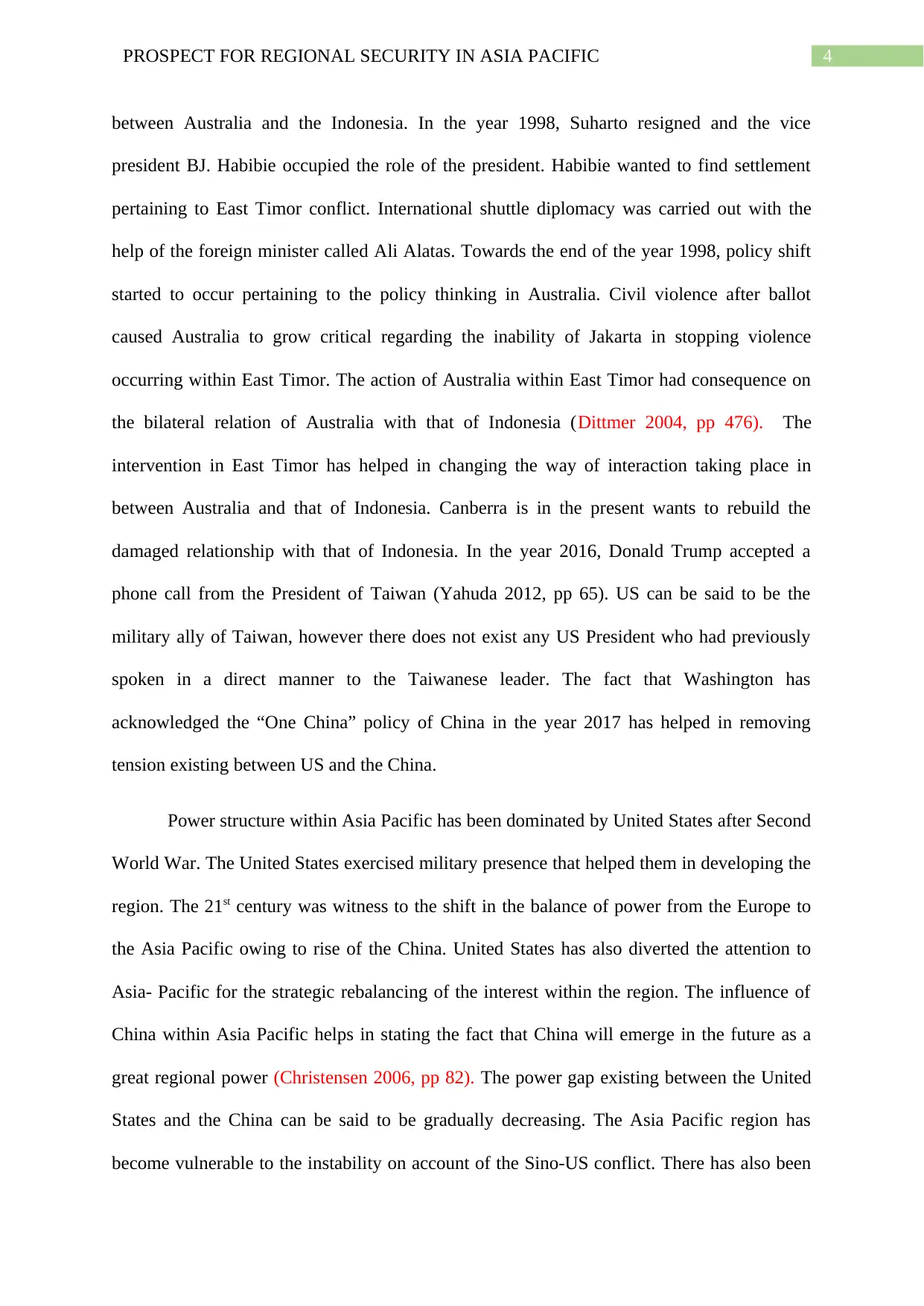
4PROSPECT FOR REGIONAL SECURITY IN ASIA PACIFIC
between Australia and the Indonesia. In the year 1998, Suharto resigned and the vice
president BJ. Habibie occupied the role of the president. Habibie wanted to find settlement
pertaining to East Timor conflict. International shuttle diplomacy was carried out with the
help of the foreign minister called Ali Alatas. Towards the end of the year 1998, policy shift
started to occur pertaining to the policy thinking in Australia. Civil violence after ballot
caused Australia to grow critical regarding the inability of Jakarta in stopping violence
occurring within East Timor. The action of Australia within East Timor had consequence on
the bilateral relation of Australia with that of Indonesia (Dittmer 2004, pp 476). The
intervention in East Timor has helped in changing the way of interaction taking place in
between Australia and that of Indonesia. Canberra is in the present wants to rebuild the
damaged relationship with that of Indonesia. In the year 2016, Donald Trump accepted a
phone call from the President of Taiwan (Yahuda 2012, pp 65). US can be said to be the
military ally of Taiwan, however there does not exist any US President who had previously
spoken in a direct manner to the Taiwanese leader. The fact that Washington has
acknowledged the “One China” policy of China in the year 2017 has helped in removing
tension existing between US and the China.
Power structure within Asia Pacific has been dominated by United States after Second
World War. The United States exercised military presence that helped them in developing the
region. The 21st century was witness to the shift in the balance of power from the Europe to
the Asia Pacific owing to rise of the China. United States has also diverted the attention to
Asia- Pacific for the strategic rebalancing of the interest within the region. The influence of
China within Asia Pacific helps in stating the fact that China will emerge in the future as a
great regional power (Christensen 2006, pp 82). The power gap existing between the United
States and the China can be said to be gradually decreasing. The Asia Pacific region has
become vulnerable to the instability on account of the Sino-US conflict. There has also been
between Australia and the Indonesia. In the year 1998, Suharto resigned and the vice
president BJ. Habibie occupied the role of the president. Habibie wanted to find settlement
pertaining to East Timor conflict. International shuttle diplomacy was carried out with the
help of the foreign minister called Ali Alatas. Towards the end of the year 1998, policy shift
started to occur pertaining to the policy thinking in Australia. Civil violence after ballot
caused Australia to grow critical regarding the inability of Jakarta in stopping violence
occurring within East Timor. The action of Australia within East Timor had consequence on
the bilateral relation of Australia with that of Indonesia (Dittmer 2004, pp 476). The
intervention in East Timor has helped in changing the way of interaction taking place in
between Australia and that of Indonesia. Canberra is in the present wants to rebuild the
damaged relationship with that of Indonesia. In the year 2016, Donald Trump accepted a
phone call from the President of Taiwan (Yahuda 2012, pp 65). US can be said to be the
military ally of Taiwan, however there does not exist any US President who had previously
spoken in a direct manner to the Taiwanese leader. The fact that Washington has
acknowledged the “One China” policy of China in the year 2017 has helped in removing
tension existing between US and the China.
Power structure within Asia Pacific has been dominated by United States after Second
World War. The United States exercised military presence that helped them in developing the
region. The 21st century was witness to the shift in the balance of power from the Europe to
the Asia Pacific owing to rise of the China. United States has also diverted the attention to
Asia- Pacific for the strategic rebalancing of the interest within the region. The influence of
China within Asia Pacific helps in stating the fact that China will emerge in the future as a
great regional power (Christensen 2006, pp 82). The power gap existing between the United
States and the China can be said to be gradually decreasing. The Asia Pacific region has
become vulnerable to the instability on account of the Sino-US conflict. There has also been
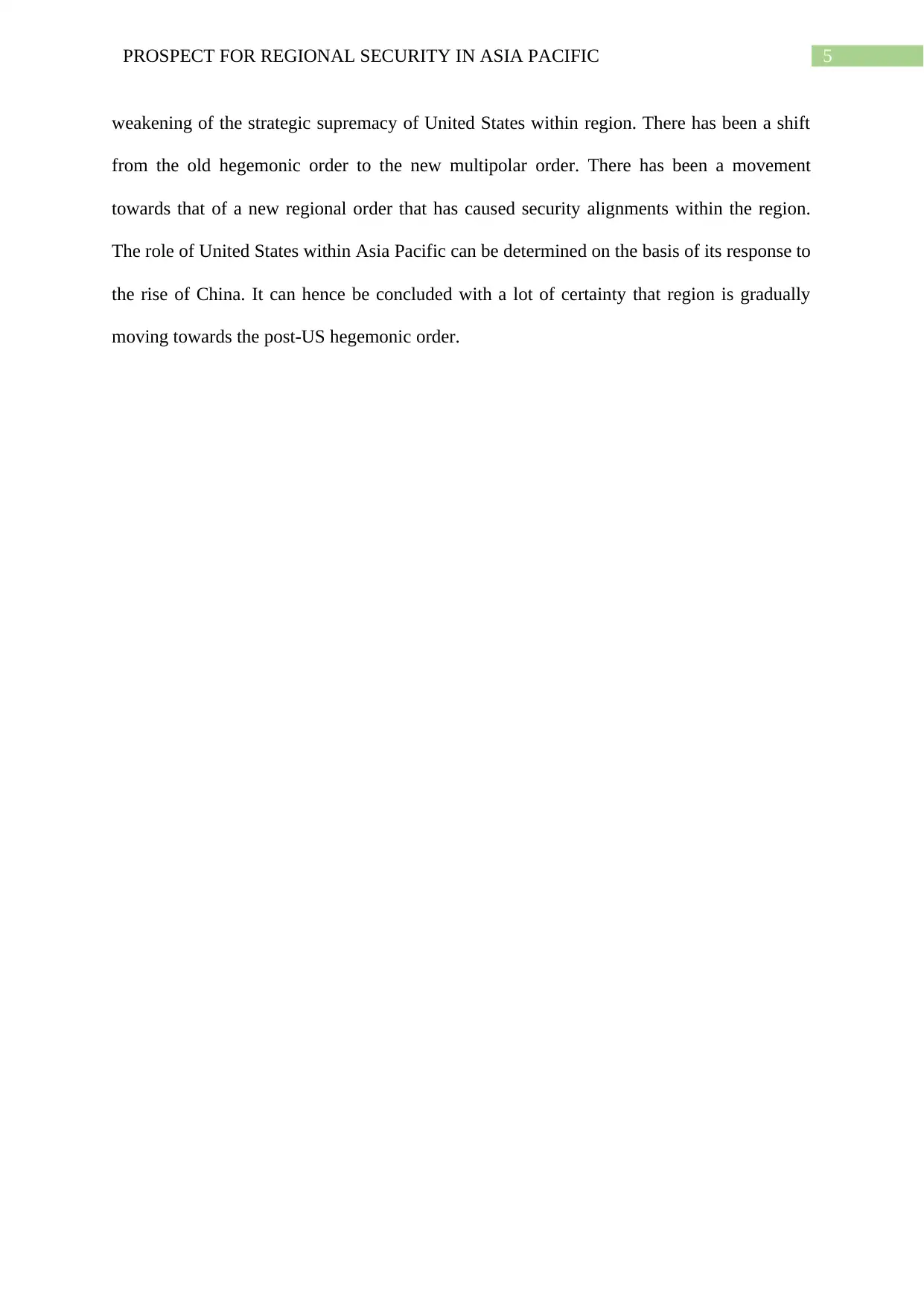
5PROSPECT FOR REGIONAL SECURITY IN ASIA PACIFIC
weakening of the strategic supremacy of United States within region. There has been a shift
from the old hegemonic order to the new multipolar order. There has been a movement
towards that of a new regional order that has caused security alignments within the region.
The role of United States within Asia Pacific can be determined on the basis of its response to
the rise of China. It can hence be concluded with a lot of certainty that region is gradually
moving towards the post-US hegemonic order.
weakening of the strategic supremacy of United States within region. There has been a shift
from the old hegemonic order to the new multipolar order. There has been a movement
towards that of a new regional order that has caused security alignments within the region.
The role of United States within Asia Pacific can be determined on the basis of its response to
the rise of China. It can hence be concluded with a lot of certainty that region is gradually
moving towards the post-US hegemonic order.
⊘ This is a preview!⊘
Do you want full access?
Subscribe today to unlock all pages.

Trusted by 1+ million students worldwide
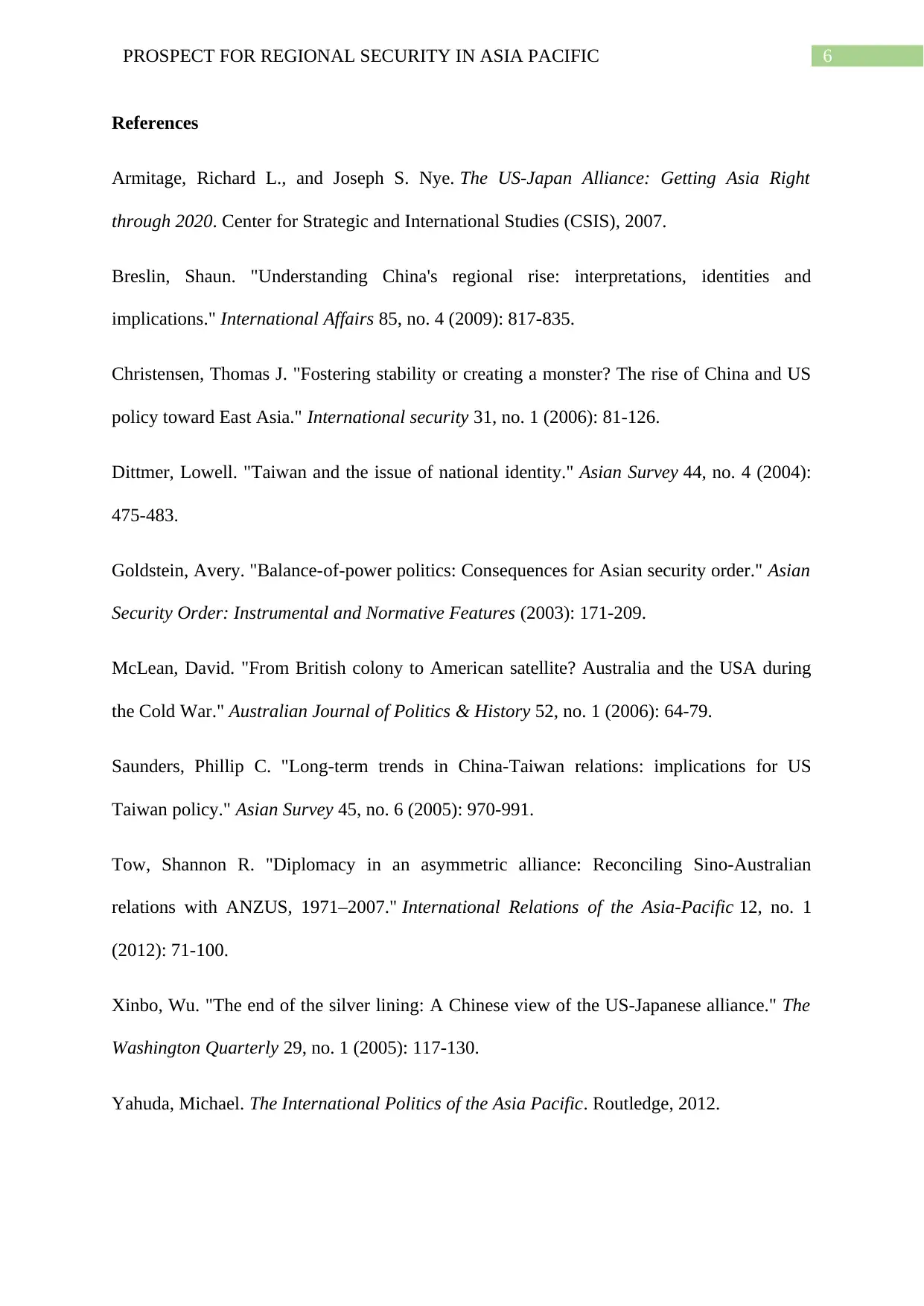
6PROSPECT FOR REGIONAL SECURITY IN ASIA PACIFIC
References
Armitage, Richard L., and Joseph S. Nye. The US-Japan Alliance: Getting Asia Right
through 2020. Center for Strategic and International Studies (CSIS), 2007.
Breslin, Shaun. "Understanding China's regional rise: interpretations, identities and
implications." International Affairs 85, no. 4 (2009): 817-835.
Christensen, Thomas J. "Fostering stability or creating a monster? The rise of China and US
policy toward East Asia." International security 31, no. 1 (2006): 81-126.
Dittmer, Lowell. "Taiwan and the issue of national identity." Asian Survey 44, no. 4 (2004):
475-483.
Goldstein, Avery. "Balance-of-power politics: Consequences for Asian security order." Asian
Security Order: Instrumental and Normative Features (2003): 171-209.
McLean, David. "From British colony to American satellite? Australia and the USA during
the Cold War." Australian Journal of Politics & History 52, no. 1 (2006): 64-79.
Saunders, Phillip C. "Long-term trends in China-Taiwan relations: implications for US
Taiwan policy." Asian Survey 45, no. 6 (2005): 970-991.
Tow, Shannon R. "Diplomacy in an asymmetric alliance: Reconciling Sino-Australian
relations with ANZUS, 1971–2007." International Relations of the Asia-Pacific 12, no. 1
(2012): 71-100.
Xinbo, Wu. "The end of the silver lining: A Chinese view of the US‐Japanese alliance." The
Washington Quarterly 29, no. 1 (2005): 117-130.
Yahuda, Michael. The International Politics of the Asia Pacific. Routledge, 2012.
References
Armitage, Richard L., and Joseph S. Nye. The US-Japan Alliance: Getting Asia Right
through 2020. Center for Strategic and International Studies (CSIS), 2007.
Breslin, Shaun. "Understanding China's regional rise: interpretations, identities and
implications." International Affairs 85, no. 4 (2009): 817-835.
Christensen, Thomas J. "Fostering stability or creating a monster? The rise of China and US
policy toward East Asia." International security 31, no. 1 (2006): 81-126.
Dittmer, Lowell. "Taiwan and the issue of national identity." Asian Survey 44, no. 4 (2004):
475-483.
Goldstein, Avery. "Balance-of-power politics: Consequences for Asian security order." Asian
Security Order: Instrumental and Normative Features (2003): 171-209.
McLean, David. "From British colony to American satellite? Australia and the USA during
the Cold War." Australian Journal of Politics & History 52, no. 1 (2006): 64-79.
Saunders, Phillip C. "Long-term trends in China-Taiwan relations: implications for US
Taiwan policy." Asian Survey 45, no. 6 (2005): 970-991.
Tow, Shannon R. "Diplomacy in an asymmetric alliance: Reconciling Sino-Australian
relations with ANZUS, 1971–2007." International Relations of the Asia-Pacific 12, no. 1
(2012): 71-100.
Xinbo, Wu. "The end of the silver lining: A Chinese view of the US‐Japanese alliance." The
Washington Quarterly 29, no. 1 (2005): 117-130.
Yahuda, Michael. The International Politics of the Asia Pacific. Routledge, 2012.
Paraphrase This Document
Need a fresh take? Get an instant paraphrase of this document with our AI Paraphraser

7PROSPECT FOR REGIONAL SECURITY IN ASIA PACIFIC
1 out of 8
Related Documents
Your All-in-One AI-Powered Toolkit for Academic Success.
+13062052269
info@desklib.com
Available 24*7 on WhatsApp / Email
![[object Object]](/_next/static/media/star-bottom.7253800d.svg)
Unlock your academic potential
Copyright © 2020–2026 A2Z Services. All Rights Reserved. Developed and managed by ZUCOL.





